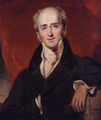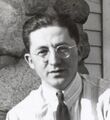Template:Selected anniversaries/March 13: Difference between revisions
No edit summary |
No edit summary |
||
| Line 1: | Line 1: | ||
<gallery> | <gallery> | ||
File:Charles Grey, 2nd Earl Grey by Sir Thomas Lawrence copy.jpg|link=Charles Grey, 2nd Earl Grey (nonfiction)|1764: [[Charles Grey, 2nd Earl Grey (nonfiction)|Charles Grey, 2nd Earl Grey]] born. His government will see the abolition of slavery in the British Empire. | File:Charles Grey, 2nd Earl Grey by Sir Thomas Lawrence copy.jpg|link=Charles Grey, 2nd Earl Grey (nonfiction)|1764: [[Charles Grey, 2nd Earl Grey (nonfiction)|Charles Grey, 2nd Earl Grey]] born. His government will see the abolition of slavery in the British Empire. | ||
File:Myrtle_Bachelder_-_1942.jpg|link=Myrtle Bachelder (nonfiction)|1908: Chemist and US military officer [[Myrtle Bachelder (nonfiction)|Myrtle Bachelder]] born. Bachelder will be responsible for the analysis of the spectroscopy of uranium for the [[Manhattan Project (nonfiction)|Manhattan Project]] during the Second World War. After the war, Bachelder will make pioneering contributions to metallochemistry. | File:Myrtle_Bachelder_-_1942.jpg|link=Myrtle Bachelder (nonfiction)|1908: Chemist and US military officer [[Myrtle Bachelder (nonfiction)|Myrtle Bachelder]] born. Bachelder will be responsible for the analysis of the spectroscopy of uranium for the [[Manhattan Project (nonfiction)|Manhattan Project]] during the Second World War. After the war, Bachelder will make pioneering contributions to metallochemistry. | ||
File:Melvin Dresher.jpg|link=Melvin Dresher (nonfiction)|1911: Mathematician [[Melvin Dresher (nonfiction)|Melvin Dresher]] (Dreszer) born. Dresher will contribute to game theory, co-developing the game theoretical model of cooperation and conflict known as the Prisoner's dilemma. | File:Melvin Dresher.jpg|link=Melvin Dresher (nonfiction)|1911: Mathematician [[Melvin Dresher (nonfiction)|Melvin Dresher]] (Dreszer) born. Dresher will contribute to game theory, co-developing the game theoretical model of cooperation and conflict known as the Prisoner's dilemma. | ||
File:Hilary Putnam.jpg|link=Hilary Putnam (nonfiction)|2016: Philosopher, mathematician, and computer scientist [[Hilary Putnam (nonfiction)|Hilary Putnam]] dies. Putnam argued for the reality of mathematical entities, later espousing the view that mathematics is not purely logical, but "quasi-empirical". | File:Hilary Putnam.jpg|link=Hilary Putnam (nonfiction)|2016: Philosopher, mathematician, and computer scientist [[Hilary Putnam (nonfiction)|Hilary Putnam]] dies. Putnam argued for the reality of mathematical entities, later espousing the view that mathematics is not purely logical, but "quasi-empirical". | ||
Revision as of 06:09, 13 March 2022
1764: Charles Grey, 2nd Earl Grey born. His government will see the abolition of slavery in the British Empire.
1908: Chemist and US military officer Myrtle Bachelder born. Bachelder will be responsible for the analysis of the spectroscopy of uranium for the Manhattan Project during the Second World War. After the war, Bachelder will make pioneering contributions to metallochemistry.
1911: Mathematician Melvin Dresher (Dreszer) born. Dresher will contribute to game theory, co-developing the game theoretical model of cooperation and conflict known as the Prisoner's dilemma.
2016: Philosopher, mathematician, and computer scientist Hilary Putnam dies. Putnam argued for the reality of mathematical entities, later espousing the view that mathematics is not purely logical, but "quasi-empirical".



